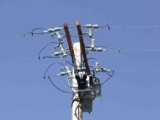 Broadband over Powerline (BPL) technology suffered a serious blow yesterday when reports surfaced that BPL service provider International Broadband Electric Communications will cease operations at the end of January.
Broadband over Powerline (BPL) technology suffered a serious blow yesterday when reports surfaced that BPL service provider International Broadband Electric Communications will cease operations at the end of January.
In a letter posted on its website, IBEC encourages existing customers to pursue other options for Internet service as soon as possible. “We expect that your service will remain active through the end of January 2012 but we cannot guarantee the quality and availability of your service during this period,” the letter states. The letter also notes that customer support will cease operations on January 16, 2012.
IBEC attributes the service shutdown to “our inability to overcome the financial damage from the April 27, 2011 tornadoes that ravished some of our major service areas.” According to a report yesterday from WVIR-TV, a news outlet serving Nelson County, Va—one of IBEC’s service areas—IBEC sustained “millions of dollars in infrastructure damage in 2011, forcing the company to shut down operations in rural communities across the country.”
But those who have followed BPL’s difficult history may suspect there is more behind the service shutdown than tornado damage.
IBEC’s farewell letter is a far cry from the tone the company took just over three years ago when it announced a $9.6 million agreement to have IBM install BPL networks using power lines operated by electric cooperatives throughout the eastern U.S. “This capability will play a critical role in rural health, education and economic development, while closing the digital divide that exists between well served and underserved America,” said Scott Lee, CEO of IBEC, in the announcement of the IBM deal.
At the time the deal was announced, the Associate Press reported that IBEC planned an initial buildout costing $70 million and covering 340,000 homes in Alabama, Indiana, Maryland, Pennsylvania, Texas, Virginia and Wisconsin. But IBEC and IBM referenced a lower target goal in February 2009 when they issued an announcement stating that the companies had forged agreements with seven different power companies to use the power company networks to deliver broadband service to 200,000 rural customers in Alabama, Indiana, Michigan and Virginia. At that time, at least two of the companies—Cullman Electric Cooperative in Alabama and Midwest Energy Cooperative in Michigan—had made limited deployments of the technology.
Telecompetitor was skeptical about IBEC’s ability to succeed from the start — and IBEC’s prospects looked even worse when an unrelated BPL deployment in Manassas, Virginia seemed to go sour in late 2009 and a local councilman told a technology website that the business was not financially sound.
BPL also has encountered challenges on the technology side—and at least one of IBEC’s original seven power companies scaled back on its deployment plans as a result. As of mid-2010, Midwest Energy Cooperative said it had no target for expanding BPL service beyond two initial substations because of problems with signals being able to travel on underground wire. At that time the cooperative was hoping to resolve those problems but there is no indication on Midwest Energy’s website that such a resolution ever occurred.
Federal agencies also appeared to be wary of the technology. Although Midwest Energy and other organizations applied for broadband stimulus funding for BPL projects, Telecompetitor is not aware of any that were awarded.
It’s unclear how extensively IBEC deployed BPL technology after its initial start. The company has removed all information other than the farewell letter from its website. But what is clear is that with IBEC’s service shutdown, the technology’s already low deployment numbers will sink even further, with little likelihood of that trend being reversed any time soon.
Perhaps the stakeholder group that stands to benefit the most from IBEC’s demise is the satellite broadband industry. As Lee has noted, IBEC was targeting rural communities with no broadband option other than satellite service.


